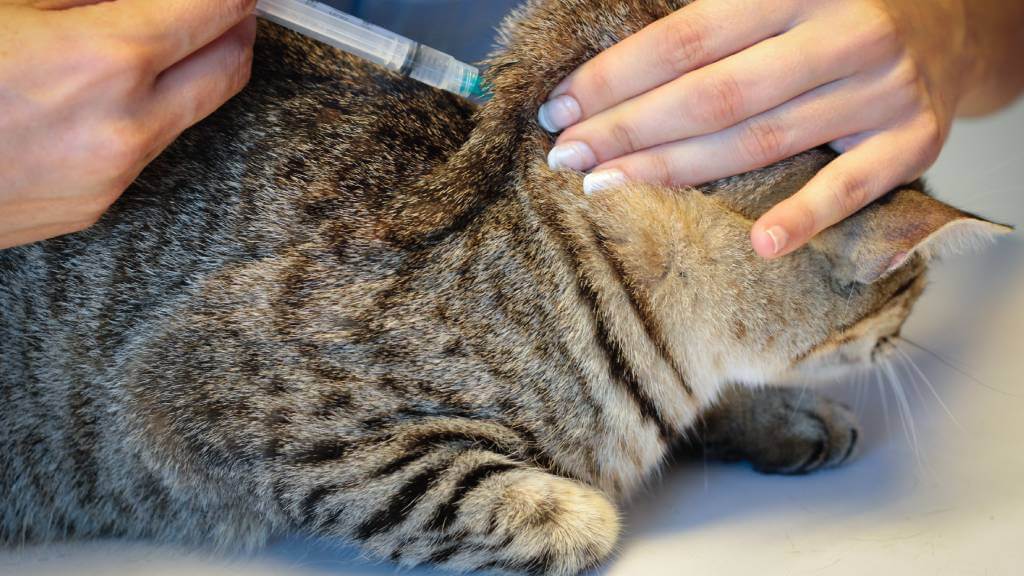A guide to cat vaccination in New Zealand

Vaccinations are one of the easiest and most effective ways to protect your cat from serious, contagious illnesses. Whether your cat is an indoor cuddlebug or has access to the great outdoors, staying up to date with their core vaccinations is essential to keeping them healthy and preventing disease outbreaks in your local cat community.
Here’s your practical, vet-backed guide to what vaccines Kiwi cats need, when to get them, and why those jabs really matter – with our expert, Dr. Rosalind Holland (BVSc, MVM, MANZCVS).
Essential vaccinations for cats
In Aotearoa, the standard core vaccine for cats protects against three viruses:
- Feline Calicivirus (FCV)
- Feline Herpesvirus (FHV-1)
- Feline Panleukopenia (feline distemper)
These are grouped together in what’s commonly called the F3 vaccine, Dr. Holland tells us.
She notes that “vaccinations are usually started at 6 to 8 weeks of age with a booster vaccination given 3 to 4 weeks after the first vaccination”.
If your cat hasn’t been vaccinated before or you’re unsure of their history, your vet will recommend an initial course to get their immune system up to speed.
Vaccinations for Feline Immunodeficiency Virus (FIV) and Feline Leukaemia Virus (FeLV) are not currently available in New Zealand and aren’t part of standard vet protocols here. Instead, it’s encouraged to focus on prevention and management in the case of infection.
Understanding the vaccination schedule
Here’s how a typical vaccination timeline looks for most cats:
Kittens:
Kitten vaccinations in NZ start early to build strong immunity, here’s what you can expect:
- First dose: 6 to 8 weeks old
- Revaccinate: Every 3 to 4 weeks until 16 weeks of age
- Booster: At 6-12 months
Adult cats:
- Unvaccinated adults typically need two doses, spaced 3 to 4 weeks apart
- Every 1-3 years as per current WSAVA guidelines
Your vet may tailor the schedule depending on your cat’s age, lifestyle, or risk factors.
Diseases to put on your radar
Vaccines guard against some pretty unpleasant (and sometimes fatal) illnesses. Here’s what’s in the F3 vaccine:
Feline Calicivirus and Feline Herpesvirus
These are two of the most common causes of cat flu or upper respiratory infections. Symptoms can include:
- Sneezing
- Runny eyes and nose
- Ulcers
- Fever
- Appetite loss
As Dr. Holland explains to us, “Although vaccinations may not be fully protective against these diseases, they will significantly reduce the severity of the illness.”
Feline Panleukopenia
This is a rarer but potentially very dangerous disease. The virus is similar to the well-known parvovirus in dogs. It attacks a cat’s gut and immune system, often leading to severe illness or death if untreated.
This virus is tough. It can survive in the environment for over a year, so vaccination is your cat’s best defence.
The importance of feline vaccinations
Vaccinating your cat protects their health, but it also protects other cats in your home and community, especially the very young, elderly, or immune-compromised. Even if your cat lives indoors, viruses can travel on shoes, hands, or shared surfaces like carry cages you take to the vet.
Vaccination also plays a vital role in your pet’s preventative healthcare plan. These regular vet visits allow you to pick up on health concerns early, before they become major issues.
How much do cat vaccinations cost?
Prices vary between clinics and towns, but generally you can expect to pay around $70 to $100 per visit. Your cat’s vaccination appointment will also include a nose-to-tail health check by the vet.
As Dr. Holland points out, “A vaccination appointment includes a full physical exam by a veterinarian, which is an important part of your cat’s preventative health care. Health issues such as dental disease or early signs of metabolic illness are often identified early in the disease course during these exams.”
Some clinics may charge less for booster vaccinations, which can sometimes be done with a veterinary nurse. Just ask when booking.
Why are repeat vaccinations important
If you’re wondering whether boosters are really necessary, short answer: yep!
Dr. Holland explains, “Repeat or booster vaccinations after the first vaccine are important to ensure there is a good initial response to the vaccine. Regular boosters help remind the immune system to be ready to combat these diseases, so there will be a strong immune response if the cat encounters the virus.”
On top of that, regular check-ups are a great chance to monitor your cat’s health, update your records, and ask questions about nutrition or behaviour.
What to expect after vaccinating your cat?
Most cats breeze through their vaccinations without any trouble. But there are a few normal side effects to keep an eye on:
- Tiredness or quietness for a day
- Mild swelling at the injection site
- Slightly reduced appetite
There’s also a small chance of a lump forming where the vaccine was injected. “It is possible for vaccinations to cause lumps at the site they are given, most of these are inflammatory and resolve without treatment, but rarely, more serious lumps can occur. Let your vet know if your cat develops a lump at the vaccination site,” Dr. Holland says.
More serious side effects, such as allergic reactions, are very rare. If you notice your cat having trouble breathing, vomiting, or collapsing, get veterinary help straight away.
Wrap-up: Keeping your cat protected
Staying up to date with your cat’s vaccinations helps protect them from some of the most serious feline diseases out there, especially ones like panleukopenia that can be fatal without warning.
Plus, those regular visits double as a full health check, meaning your vet can spot signs of illness early before they become costly or difficult to treat.
Falling behind? Don’t worry. Your vet can always help you restart the schedule and get your kitty back on track. To protect your cat against the unexpected, whether that’s illness, injury or a health scare, check out SPCA Pet Insurance.
While vaccination is considered routine care, and not covered, pet insurance can still help mitigate the cost of unplanned vet visits.
30 Oct 2025
